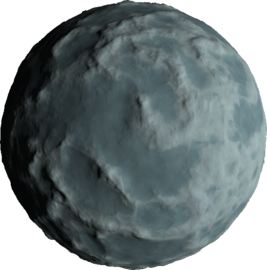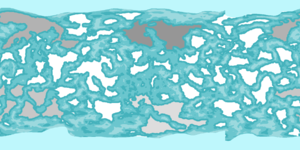Difference between revisions of "Vall"
m (→Biomes) |
Harryyoung (talk | contribs) (→Biomes: New Biome) |
||
| Line 26: | Line 26: | ||
== Biomes == | == Biomes == | ||
| − | Vall has 8 [[biome]]s. | + | Vall has 8 [[biome]]s. It has mostly Large lowlands broken up by Midlands and Highlands with some high Mountains in between. There are four distinct Basins and Poles available as well. |
=== Biome list === | === Biome list === | ||
| Line 34: | Line 34: | ||
* Midlands | * Midlands | ||
* Lowlands | * Lowlands | ||
| + | * Mountains | ||
* Northeast Basin | * Northeast Basin | ||
* Northwest Basin | * Northwest Basin | ||
Revision as of 20:43, 13 October 2016
| Vall | ||
| Vall as seen from orbit. | ||
| Moon of Jool | ||
| Orbital Characteristics | ||
| Semi-major axis | 43 152 000 m [Note 1] | |
| Apoapsis | 43 152 000 m [Note 1] | |
| Periapsis | 43 152 000 m [Note 1] | |
| Orbital eccentricity | 0 | |
| Orbital inclination | 0 ° | |
| Argument of periapsis | 0 ° | |
| Longitude of the ascending node | 0 ° | |
| Mean anomaly | 0.9 rad (at 0s UT) | |
| Sidereal orbital period | 105 962 s | |
| 4 d 5 h 26 m 2.1 s | ||
| Synodic orbital period | 106 069.5 s | |
| Orbital velocity | 2 559 m/s | |
| Longest time eclipsed | 4 706 s | |
| Physical Characteristics | ||
| Equatorial radius | 300 000 m | |
| Equatorial circumference | 1 884 956 m | |
| Surface area | 1.1309734×1012 m2 | |
| Mass | 3.1087655×1021 kg | |
| Standard gravitational parameter | 2.0748150×1011 m3/s2 | |
| Density | 27 487.522 kg/m3 | |
| Surface gravity | 2.31 m/s2 (0.235 g) | |
| Escape velocity | 1 176.10 m/s | |
| Sidereal rotation period | 105 962.09 s | |
| 4 d 5 h 26 m 2.1 s | ||
| Sidereal rotational velocity | 17.789 m/s | |
| Synchronous orbit | 3 593.20 km | |
| Sphere of influence | 2 406 401.4 m [Note 1] | |
| Atmospheric Characteristics | ||
| Atmosphere present | No | |
| Scientific multiplier | ||
| Surface | 12 | |
| Splashed | N/A | |
| Near space | 9 | |
| Outer space | 8 | |
| Recovery | 8 | |
|
| ||
Vall is the second of the five natural satellites of Jool. Like the other large Joolian moons, Laythe and Tylo (of which Vall is the smallest), Vall is tidally locked to its parent. Synchronous orbits around Vall are not possible, as they would lie outside of its SOI, at a radius of 3,893,254 meters.
Vall is KSP's analog to Jupiter's moon Europa.
Though the bodies have topical similarities, landing on Vall and returning is significantly more challenging than a landing on the Mün, due to the former's higher gravity, more uneven terrain and distance from Kerbin.
According to former developer NovaSilisko, Vall was planned to be made more like Eeloo, with cracks in the ice and a more chaotic surface than in 0.20.2.[1]
Contents
In-game Description
| “ | Vall was one of the last Moons of Jool to be discovered. Frustrated scientists kept trying to wipe it off the lenses of their telescopes. Eventually after a rash of returned telescopes, Advanced Optics Co. finally decided to just tell them it was an actual object in the sky. | ” |
Topography
Vall has an icy surface dominated by hilly lowland areas separated by mountain ridges and which ranges in elevation from 0 to 7976 m. There are almost no completely level areas, making it hard to find good landing spots.
Vall has some circular mountain ridges which could be remnants of impact craters, but they are heavily eroded, hinting that Vall has some geological activity, presumably in the form of cryovolcanism.
The surface color ranges between white and light blue. When terrain scatters are activated, large boulders with contrast-rich black and white surface patterns can be found on the surface.
Biomes
Vall has 8 biomes. It has mostly Large lowlands broken up by Midlands and Highlands with some high Mountains in between. There are four distinct Basins and Poles available as well.
Biome list
|
Reference Frames
| Time warp | Minimum Altitude |
|---|---|
| 1× | Any |
| 5× | 24 500 m |
| 10× | 24 500 m |
| 50× | 24 500 m |
| 100× | 40 000 m |
| 1 000× | 60 000 m |
| 10 000× | 80 000 m |
| 100 000× | 100 000 m |
Gallery
Trivia
- According to the Tracking Station information of Vall, it was one of the last moons of Jool to be discovered. This was because the Kerbal astronomers mistook the icy moon for a smudge. After multiple failed attempts to get rid of the "smudge", they figured out it was, in fact, a moon.
- If N-body simulation was used in the game, Vall would be slingshotted out of the Joolian system within a few days, due to the gravitational influences of nearby Laythe and Tylo.
Changes
- Added biomes
- Added biomes
- Initial Release
Notes
- ↑ Post in the forum by NovaSilisko











